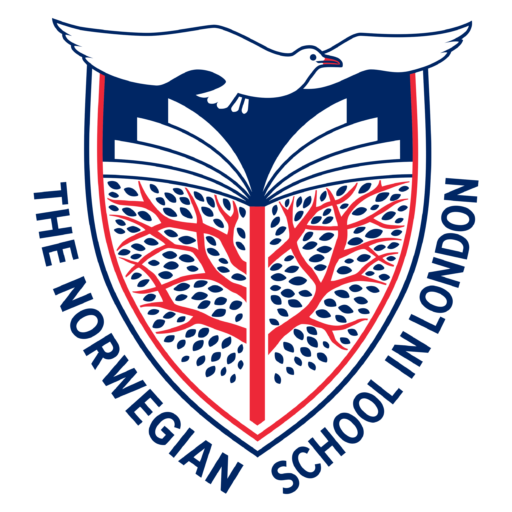Welcome to Year
8.-10.
Who am I? What do I want to be?
Why is the world the way it is?
Adolescence is important and the choices
one faces, both academically and socially,
will set the course for life. Therefore, we
want to support students to become safe,
knowledgeable and innovative citizens.
We believe the student becomes richer when they get to explore different disciplines,
make new impressions and experience
things together.
Year 8-10 are taught in the same classroom,
but with adapted teaching and follow-up for the different year groups. This enables teachers to easily follow-up each individual student, whether to
challenge the students towards new goals
or to offer extra support.
A number of trips and excursions are
arranged, especially early in the school year
to ensure that students experience a good
start socially. There is an annual trip to a European city and in addition we use London and the surrounding area as often as we can for sporting activities ( for example climbing,
kayaking, tennis, rugby, badminton)
museums, theatres, galleries and
exhibitions. This helps to motivate and
engage students in their learning.
Committed and knowledgeable teachers
strive to give students new knowledge and to challenge their understanding of
world
goals. By emphasising critical thinking and ethical
awareness, this contributes to making the
students at the Norwegian School
reflective and robust in the face of
tomorrow’s society.

Meet a pupil from Year 8.-10.
This is Julian og Vincent from year 8.-10. at at The Norwegian school in London.
f.a.q.
information about years 8.- 10.
8. – 10. has a total of 24.5 hours per. week, where a school hour is 60 minutes. The school days last from 08.45 to 15.30 Monday to Thursday and 08.45-14.30 on Friday.8.-10. shares classrooms and has a common form teacher.
The school follows an annual plan that covers all the competence goals from the curriculum (subject renewal/”fagfornyelse”). Each week, students receive a work schedule with information on what to do that week. In addition, students and teachers prepare an overview of various assignments, tests, trips and excursions that will take place during the semester.
Each semester, students also have a student-led development conversation with their form teacher. Student and form teacher talks about school work and the social. In this way, the student receives close follow-up, which enables changes if needed. Parents are present at this meeting.
Some of the topics we teach are explored in our own class, while others work across subjects and age groups that include the whole school. “Public health”, “life skills”, “Sustainable development” and “Democracy and citizenship” are examples of such common and interdisciplinary themes. At the Norwegian school in London, all subjects contribute to developing students’ basic skills in addition to developing students’ creativity, wonder and curiosity through culture, literature, commitment and practical work. We want to develop students’ creativity, wonder and curiosity through culture, literature , commitment and practical work.
Students have 3 hours of English per. week. In addition, the school offers teaching in Cambridge ESOL once a week as part of preparation for exams developed at the University of Cambridge for foreign students in the UK. Passed exam shows which level the student masters when it comes to expressing themselves in daily life in English as a second language. It is voluntary to take these exams.
The grade point average for pupils in upper secondary school is above the national average for Norwegian public and private schools.
We offer Spanish or French as electives in addition to English specialization.
Students can choose between the elective subjects “Physical activity and health” and “Technology and design”.
All subjects except Home Economics are graduating subjects in 10th grade. A position for these subjects will be set in late spring. Home Economics is a graduating subject in 9th grade.
Students who have completed a subject at another school retain their Final assessment grade (Final grade) that was given. This also applies to our students in the subject Home Economics if the new school has this subject in the 10th grade.
There are other rules for elective subjects as students can choose to change or continue the elective subject during secondary school.
We strive to use the great diversity that London has to offer. We visit historic buildings, several museums, art galleries, various theaters and various houses of worship as part of the teaching.
We engage instructors for various activities in physical education such as climbing, swimming, street dancing, fencing, tennis, cricket, rugby and football. We also have activities such as kayaking, sailing, beach volleyball and badminton / squash. In addition, every year we arrange various activity days such as skating day, nature trail, sports day and Christmas workshop.
We also organize a stay abroad every year where we visit Brussels, Spain or France. The stay abroad is anchored in the curriculum in addition to building a strong unity among the students in the learning environment.
During the school year, we also arrange various events such as Christmas balls where students from the Swedish school are invited. The students at the Norwegian school are invited to a summer ball at the Swedish school. Traditionally, the year for secondary school ends with a camping trip.
We have had several students who have gone to both Norwegian and English upper secondary schools. One should be aware of examining application deadlines and admission requirements for the schools one wishes to apply for, as there may be different deadlines and regulations one may have to comply with.
